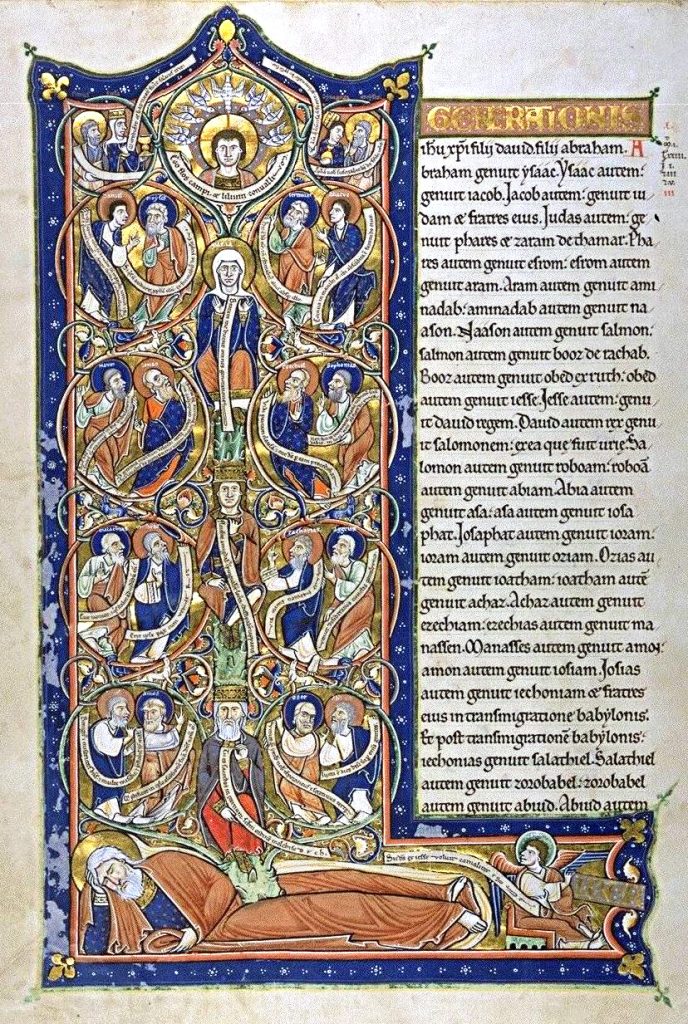For our three weeks of Advent this year, we will be reading through the infancy narrative of Matthew’s gospel found in Matthew 1-2. I invite you to join us on Tuesday nights during this season as we celebrate Jesus’ birth. This week is the Genealogy found in Matt. 1:1-17.
Matthew begins his work with the words: “The book of the genealogy of Jesus Christ, the son of David and son of Abraham.” Matt. 1:1. The genealogy is not only important to demonstrate that Jesus is the biological descendant of and the fulfillment of God’s covenants with Abraham and David, but also to demonstrate that (1) Jesus is the final great act of God in human history and (2) that God sometimes acts in mysterious ways.
A New Era:
First, the genealogy gives us three eras of fourteen generations (two groups of seven). The first era runs from Abraham to David when God’s people were nomadic. The second era runs between David and the Babylonian Captivity when God’s people lived under a human monarch. The third era is from the Babylonian Captivity to Joseph when God’s people had lived in exile under various foreign rulers. Jesus is the beginning of a new era. With Jesus, God’s people are entering into a new relationship with their God. Matthew’s gospel is the story of what this new era and new relationship look like.
Women of the Genealogy:
Matthew’s genealogy mentions four women – Tamar (v.3), Rahab (v.5), Ruth (v.5), and Bathsheba (v.6). Ancient Judaism (before the destruction of the Temple in 70AD) being patrilineal, these are the only women mentioned. Matthew’s mention of these four women foreshadows the questionable circumstances surrounding Jesus’ own conception and demonstrates that God can and does work out his plan through scandalous or irregular means.
The story of Tamar is found in Genesis 38. Tamar is married to the eldest son of Judah (the son of Jacob/Israel and the eponymous founder of the tribe of Judah). Her husband dies, and so Judah gives her his second son in a Levirate marriage. He also dies. Judah refuses to allow her to marry his third son, and Tamar is faced with the shame of not bearing any children for her deceased husband. To get around Judah’s prohibition, she poses as a prostitute and then sleeps with Judah, her father-in-law. She gets pregnant and bears two sons. Jesus is the descendant of this dishonest and incestuous conception.
We have previously read about Rahab in our study of the Bad Girls of the Bible. Her story is found in Joshua 2:1-21, 6:17-25. Rahab was a prostitute by profession in the Canaanite city of Jericho. She was, of course, not an Israelite. When Joshua’s men came to spy on the land for conquest, Rahab gave them lodging. In return, when Joshua’s troops destroyed the city of Jericho, he spared Rahab and her family. Jesus is the descendant of this foreign prostitute.
The story of Ruth is in her eponymous book. Ruth was from Moab (again, not an Israelite) who married a Judean immigrant. When he dies, she becomes a childless widow who accompanies her mother-in-law, Naomi, back to Naomi’s hometown of Bethlehem in Judah. There she marries a Bethlehemite (a descendant of Judah). She bears him a son who becomes David’s grandfather. King David’s great-grandmother, therefore, is a foreigner and is Jesus’ ancestor.
The final woman mentioned is “the wife of Uriah” – Matthew refuses to say “Bathsheba.” We have previously read about Bathsheba in our study of David. We find her story in 2 Samuel 11 and 1 Kings 1. Bathsheba is married to Uriah the Hittite – one of David’s mighty fighting men. While Uriah was out at war, David was back in Jerusalem summoning Bathsheba into his room. Their adulteress union (of which Bathsheba was probably an unwilling participant) resulted in pregnancy. David has Uriah killed and takes Bathsheba into his harem. This first child dies soon after birth, but Bathsheba eventually bears David’s successor – Solomon. Jesus is the descendant of this violent union.
If you have time today, please read about each of these women.
Dinner is at 6:30. The menu is turkey noodle soup and grilled cheese. Discussion about 7:15. Please let me know if you plan to join us.
But when the time had fully come, God sent forth his Son, born of woman, born under the law, to redeem those who were under the law, so that we might receive adoption as sons.
Galatians 4:4-6


Pingback: Ephesians 1:11-14, We, You, and Ours – Ancient Anglican
Pingback: The Gospel of Luke – Luke 3:1-22: The Baptist – Ancient Anglican
Pingback: The Gospel of Luke – Luke 3:23-4:13 – The Temptations – Ancient Anglican